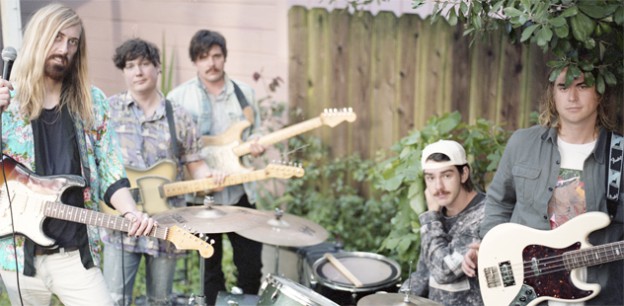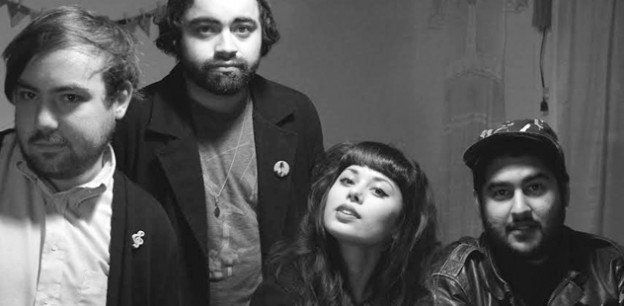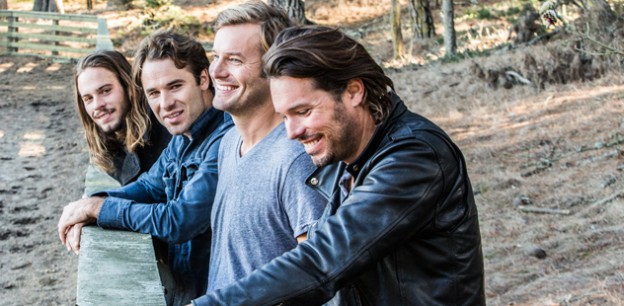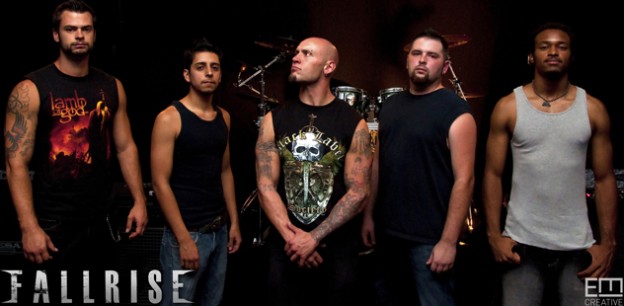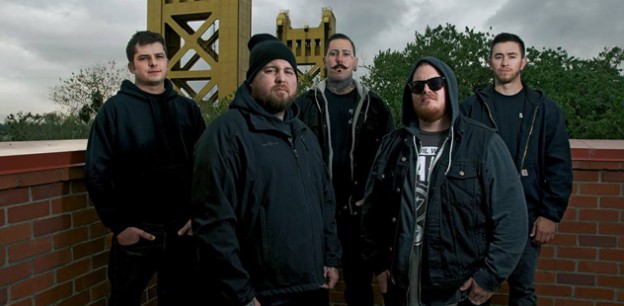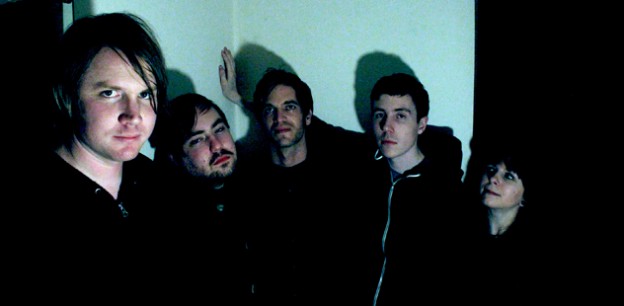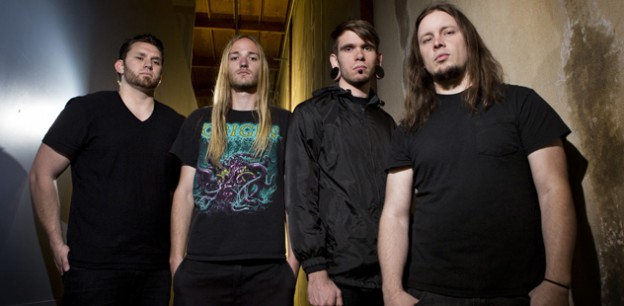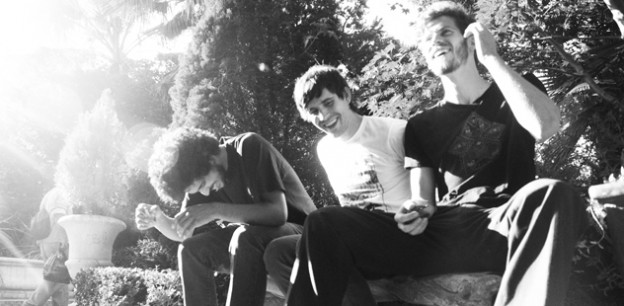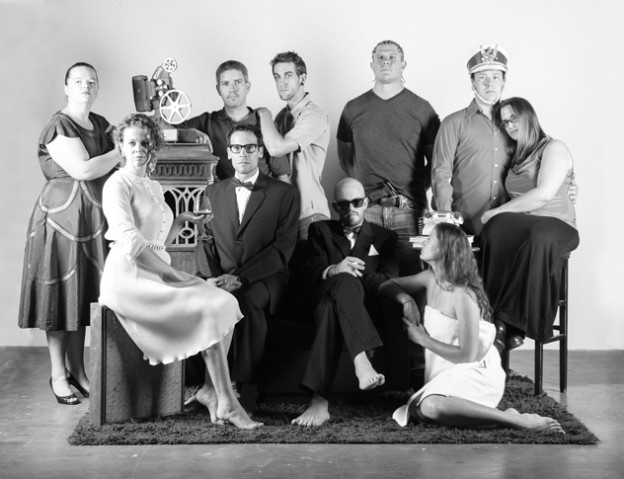Humble Wolf amp up the riffage on their forthcoming album, Black and White
If you see some of the latest band photos of Humble Wolf, you might be slightly intimidated. They’re all wearing sunglasses and have immaculate rock ‘n’ roll hair.
But it’s not long before bassist David Albertson humbly says, “We’re all nerdy musicians, you know… What you see is what you get.”
Perhaps he means nerdy in the sense that he and the band’s lead man Jayson Angove have software engineering backgrounds, and that drummer Jesse Sherwood is an IT guy. After all, Angove was instrumental in troubleshooting Skype so that he and Albertson could video chat with Submerge.
Or, perhaps it’s because the Roseville-based band, comprised of Angove on vocals, guitar and keys, Chris Winger on backing vocals and guitar, Albertson on bass and Sherwood (Kit Coda) on drums, spent the last two years laboriously perfecting their latest album Black and White side-by-side with their engineer and producer Sean Stack.
“I think I speak for everybody in the band when I say we take pride in our craft,” Angove says. “It’s two years of hard work finally coming to an end, where we can finally show people what we’ve been working on for so long.”
They will have the opportunity to do so at their CD release show at the Shady Lady in mid-January.
The album was recorded at Fat Cat Recording Studio in Sacramento, and it is an intentional move away from the more pop feel of Paper Thin, the last Humble Wolf record, and a step closer to rock ‘n’ roll.
“Paper Thin is really more on the mellow side,” Angove reflects. “I would say it’s more easy listening.”
“I’d probably say we’re like the Foo Fighters meets the Black Keys for this new record,” Albertson adds.
It’s any band’s hope to meet a funding goal via crowdfunding platforms like Kickstarter, and it’s any band’s fantasy to exceed it. Humble Wolf did. In fact, that’s how the band funded the completion of Black and White. Just a month after they posted their funding campaign in July, they exceeded the pledged amount by $270.
“It kind of spread around like wildfire,” Angove says. “I can’t express enough gratitude for how much it helped.”
Thanks to the extra cash, the band could finish mixing and mastering the album and get more physical copies made. They also could make up T-shirts, posters and custom sunglasses to give to their funding backers and to sell as merch at upcoming shows.
Black and White is solidly rock ‘n’ roll, featuring Winger’s rocking guitar solos, with the occasional tastes of indie folk, like the song “9 a.m.” The song that perhaps shows off the band’s strengths the most, however, is “Through the Walls,” Angove and Albertson agree.
“This Should Scare You” is arguably the dominant song on the record, and a searing critique of mainstream culture. Angove’s vocals ride a simple guitar riff before cutting into a bridge where he resentfully sings, “There are too many ‘I’s in this generation/They are blind to the world around them/Their minds are starving and their hearts are empty/I am sick that I am a part of you.”
By definition, these guys are full-time musicians. They’ve played in various projects together. Currently, Angove, Winger and Albertson are in the cover rock band Guitar Head, and Angove also plays with local singer Rebecca Peters, a project that Albertson was formerly a part of. Angove, Winger and Albertson teach private music lessons, and Angove is also a recording engineer at One Eleven Studios in Roseville.
As far as Humble Wolf goes, the band’s beginnings go back to 2010. The name was originally for Angove’s solo recording project. He completed his first recording, Never Mind This Resistance (no longer available), in his apartment with Albertson and a few friends before he moved to Australia.
He moved back home a year later. Paper Thin came next, which mostly featured Angove playing. That was recorded in about 10 days.
Angove had already known Winger and Albertson for years, since middle school. They all grew up listening to a lot of classic rock, and eventually decided it was time to start playing music together. Sherwood came into the picture later on, after he met the three at a drum-off at Guitar Center.
Since they’ve become a four-piece band, they’ve played all over town, including Concerts in the Park, Tap Folsom and the California Brewers Festival.
This year is looking good for the band already. Not only do they have lots of shows lined up, they’re aiming for tours throughout the spring and summer with plans to hit Portland and Eugene, Oregon, in April. They’re hoping to play the Knitting Factory in Reno, SXSW and Outside Lands.
And, they are working on new material, at least 10 to 15 songs’ worth, that they hope to release this summer. Save your ears for that.
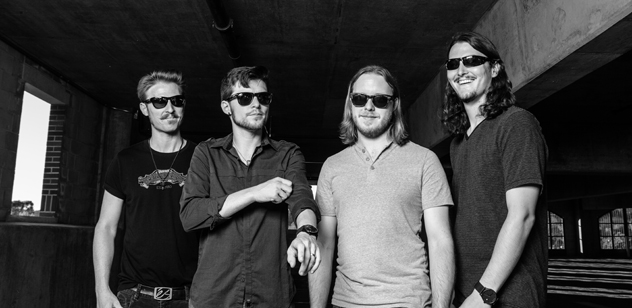
How has it been being a band in Roseville, or forming a band in Roseville?
David Albertson: The suburbs are fairly involved in Sacramento all the time because it’s not that far. We do have a good following, and we play a lot of places locally in Roseville, like Bar 101 and the Trocadero Club. But we also play at Harlow’s, the Shady Lady and Ace of Spades. We play in Sacramento pretty regularly. It’s just this big melting pot; there’s a big scene… I think if anything it kind of helps to work our way into the city.
Which song or songs would you say were most difficult to record and why?
DA: When we go into the studio, all the songs have been worked out… The mix, I think that’s what we spend the most time on… It’s probably the most challenging thing when you’re blending all the different instruments and recording takes.
Jayson Angove: I often say that Sean Stack is the fifth member of Humble Wolf because he takes great care, and he really makes us sound fantastic.
Rewording that question, which songs were most difficult to write?
JA: I definitely have a philosophy to not write overly complicated music. It’s not that we’re unable to do that, it’s just that when we play a show, we want to put on a show, too. If you’re playing something that’s technically demanding, you’re going to spend a lot more time focusing on your playing, and it’s harder to move around and be energetic when you’re just shredding away on your instrument. It’s more fun to have a song that’s not overly complicated, that’s enjoyable to play, so you can move around and put on more of a show.
How did you come up with the lyrics for “This Should Scare You?”
JA: I’ve worked a lot of retail and a lot of minimum wage jobs, and I like to read a lot about what’s happening in the country. There was a report that was released recently about how many hours you would actually have to work a week on minimum wage to actually meet livable standards. And it was something like, in no state working 40 hours a week would you actually support yourself on minimum wage. It was more like 80 to 100 hours a week was more realistic. Also, a lot of people don’t really talk about what’s happening. Or, if they do, they don’t actually do anything about it, they just talk about it, accept it as though it’s kind of how it is, and just let it happen that way. I wish people would pay more attention.
Are you guys the same offstage as you are onstage, or do you have a Humble Wolf persona?
DA: We’re all nerdy musicians, you know? I think the music’s pretty honest. We don’t wear spandex. What you see is what you get, which is what I think people grasp, what they like to see. I don’t think any of us have any Axl Rose personas going on or anything like that.
But you guys do look pretty rock n’ roll in your profile pictures.
JA: Well I appreciate that. I try to be as rock n’ roll as I can all the time!
Check out Humble Wolf’s album release party for Black and White at Shady Lady in Sacramento on Jan. 16, 2015. Check out Shadyladybar.com for more details, or hit up the band on Facebook (Humblewolfmusic).
Ex-Ganglians member Kyle Hoover on the first album from his new group, Tiaras
All eras are defined by the fact that, eventually, they will end. There can be no Summer of Love Without a Winter of Discontent; no Woodstock without an Altamont; no old guard without a new wave; no lo-fi renaissance without a hi-fi takeover. Tiaras, a San Francisco rock outfit forged from the remnants of other groups (Blasted Canyons, Fine Steps, Sacramento’s own Ganglians), is starting the year by releasing a full-length illustration of this principle. The self-titled debut album, out Jan. 14, 2015, is a clear step away from the modes and methods characterizing the earlier work of its musicians. Where Ganglians once stood for a wild, heat-shimmery psych pop indebted to bands of the ‘60s, Tiaras glides—not leaps—further into music history (say, about two decades), emerging into a clearer, moodier intersection of mid-‘80s jangle-pop and new wave. Whatever the eras and styles that reverberate in Tiaras’ music, a few things are clear: their melodies are strong, their production is crisp and Tiaras may be one of the first great rock albums of 2015.
To get a deeper insight into the new record and its prehistory, we dialed up guitarist Kyle Hoover, who was spending his weekend hanging out in the illustrious Haight-Ashbury neighborhood of San Francisco. When considering the changes his band has been through, I wondered beforehand: how much of a hold does the past still have on that place? Does the feverish, acid-drenched zeitgeist of yesteryear still contain a slight hold on the City by the Bay? As numerous other bands from the local scene begin to decamp for other horizons, we can tell a lot about the current landscape from the musicians who have opted to stay. The music of Tiaras, for one, seems well suited to its locale. While traversing the bittersweet highs and lows of standout track “In the Room,” you can imagine the swift changes of elevation and climate one comes across while traveling through the city: the top of a tower, the bottom of a hill; burning sunshine and bone-chilling fog crowding into a single moment.
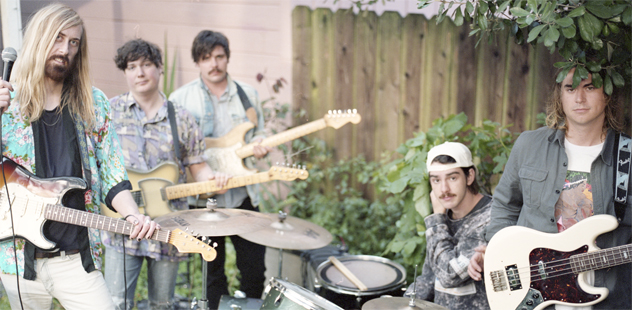
You’ve mentioned before that you’ve been living in the Excelsior area of San Francisco, how it’s fertile creative ground, but a lot of the old guard are moving south for greener pastures. What’s your point of view on these changes?
I’d say the curtains have been drawn back a little bit. I was joking around with my bandmates about the “endless summer of lo-fi ‘09.” It was this big thing—lo-fi garage, it was huge, it was everywhere. I mean, we were part of that too back in the day, but, I mean, me personally, I got over backing that stuff pretty quickly, and that’s part of the reason for the change. There’s definitely a message that we wanted to send going forward with Tiaras, like, “Alright, we live in San Francisco. We used to be kind of a garage band. Now let’s do something different.” A little more solemn, little more pop-oriented. We just wanted to do something different, and lo and behold, a year later, after the record finally comes out, there’s a bunch of other bands who are sort of shying away from that [lo-fi] scene as well.
A lot of my friends moved away—that’s just how it is. It’s super hard to live in the city. But it’s not the end of the world, there’s still cool stuff. I think if anything, it’s for the better that the garage thing has kind of faded a bit from the spotlight in San Francisco. More room to breed different genres.
The genre shift—going to the hi-fi sound, concentrating on the pop melodies—did you have anything to model yourselves on?
With this record, we definitely wanted to make it sound as good as possible. I’m a fan of using the best of both worlds—digital recording is super convenient and makes for a much less stressful recording environment; however, going analog is beneficial for different sounds. You can have the best of both worlds and get really experimental. With Ganglians, we were always trying to be hi-fi; it just always sounded lo-fi because we didn’t know what the fuck we were doing. But the idea was always to try and sound as good as possible. Genre-wise, the shifts…we just started listening to different stuff. I knew Ryan [frontman for Ganglians, Tiaras] in ‘08, and we were like, “Dude! Pet Sounds!” And the influence of that album is super evident in Ganglians. For the new record, Ryan and I were getting into a lot of weird, obscure ‘80s music, along with the rest of the world, apparently—but I guess that’s just how it goes. We just wanted to disassociate ourselves from our previous sound, which is hard because I still sound like me, and Ryan still sounds like himself. Now we have three other awesome dudes with their own take on things, and I think it works. People aren’t saying we sound like the Beach Boys anymore, so that’s fine.
When you say you all started listening to different stuff, was there anything in particular that you got excited about?
Ryan and I got really into Chrome, which was like this super weird, kind of avant-garde ‘80s rock thing. I don’t even know how to describe it. We’d heard about them from back in the day, but we started listening to them all the time. I personally started listening to a lot of Echo and the Bunnymen…just a lot of weird ‘80s stuff that I knew was good but that I’d never really taken the time to listen to. When the Cleaners from Venus record was reissued a few years ago, that was being played around our house 24/7. That was definitely a record I was super stoked about.
Was there a good deal of downtime between the dissolution of Ganglians and the recording for Tiaras?
Oh yeah, definitely. I think we stopped playing together after our last SXSW, which must have been the spring of 2011. Ryan moved to San Francisco, our drummer moved to Brooklyn, our bassist moved to Oakland and I was stuck in Elk Grove. I was living at my dad’s house for a good eight months until I finally saved up enough money to move in with Ryan in SF.
Did a lot of the ideas for the new group and album come out of that eight-month period?
That would be nice, but definitely not. That was more of like a—I don’t know, we were so worn out. I think at that point, we’d been on the road almost constantly for like a year and a half. We were starting to argue a lot, and it was kinda gnarly. So I was mostly just being miserable in Elk Grove, commuting to Davis with Alex’s [Ganglians drummer] mom every morning. That’s basically what I did. If anything was going on idea-wise during that period of time, it was with Ryan and Antonio in San Francisco while they were jamming together.
It seems collectively like you have decades of band experience—you’ve been in a lot of bands, you kind of know the drill. At this point, is it easier for you to tell when the chemistry is right, or when you’re ready to call it a day?
Yeah, I’d say so. This is probably only my third band, but this time, the songs came together easier. Ganglians was like a shitload of trial and error. That was kind of a turning period, because we were all new to what we were doing. With Tiaras, it was super easy to make things work. I’d say there was a year’s worth of time where we were learning to play with each other. And it wasn’t super natural at first, but now we all understand what we’re trying to do.
Playing TBD this past October was sort of a mini-Sacramento homecoming for you guys. How was the experience?
It was fun! It kind of felt like a Sacramento Burning Man or something. Everyone was walking around with scarves on their face and dust was everywhere. I definitely partied too hard, because I stayed there for the whole weekend. I think we were all hungover for like a week after that.
Finally, how do you feel about Tiaras as a group at this point?
When Tiaras first started, I had known Ryan pretty well from being in Ganglians. I’d known Antonio pretty darn well—I think I’ve known that guy since he was like 16—and I had just met Adam and our bassist Ryan Hansen, so I was getting to know them, and we were figuring out how to play together and what our sound should be like. Needless to say, we’re still fucking with our tone settings and our amps to figure out what sounds we have and stuff like that. But I feel like the songs are getting better, and we’re getting better at writing them.
See Tiaras live at Harlow’s in Sacramento on Feb. 10, 2015. Tiaras will be playing in support of The Dodos. Tickets are $15 and can be purchased through Harlows.com. Doors open at 7 p.m.
Could G. Green Become Sacramento’s Most Loved Band?
G. Green was once the most unpopular band in Sacramento. Originally Andrew Henderson’s bedroom recordings moniker, his solo shows in Sacramento garnered anathema of clandestine ridicule and indifference. There was a time I loathed seeing the name listed on every Hub show and house party, and I wasn’t alone. It was fun to smear G. Green in 2009 and it was excruciating to see them on the verge of amateurish implosion in 2011. Most of you probably still assume G. Green is locked into a static identity as Midtown brats, drunk on youth, and too drunk to do much besides be obnoxiously loud. While we were laughing, when we stopped caring and stopped looking, G. Green quietly became a serviceable indie band, writing songs destined to shed the onus of snotnosed bush leaguers.
Before she became G. Green’s drummer, Liz Liles described the first G. Green show (a one-off lineup consisting of Henderson on guitar and promoter Rick Ele on drums) as horrible and a disservice to the former KDVS DJ’s sterling reputation.
“I thought ‘why is DJ Rick playing with this idiot,’” she said. “Me and whoever I was with, we watched one song and then went into the alley to smoke cigarettes.”
In the greenhorn years of the band, Henderson was the perpetual opener; the sort that would clear a venue, living room or DIY space except for his steadfast cheerleader, DJ Rick.
“I put him in front of audiences, and the awkwardness, the house slippers on his feet, and the most piercing moments of singing were initially a big turnoff to people,” Ele said. “But Andrew seemed totally impervious to disapproval.”
*****
They’re all laughing at you, aka the infamous Capital Bowl show
Mt. St. Mtn. founder and former Mayyors member Mark Kaiser put out G. Green’s first record, Crap Culture, in 2012, but it took time for him to become a backer. In gathering stories of infamous G. Green failures, Kaiser and Liles invoked the West Sacramento Capital Bowl show in 2008 without hesitation. In those days, bands would rent out the events room to play, and according to Kaiser, “trash.” The bill was geared toward trashing the place with Mayyors and Eat Skull (a notoriously self-destructive Portland band), while the G. Green solo set was the black sheep. Liles said she and her friends openly ridiculed the G. Green set. While Kaiser likened the clumsy solo performance as arriving “too late for that mid-’90s Olympia-wrought ‘any art is good art’ vibe.” Henderson was not going to be the next Calvin Johnson.
“Andrew was really young, and looked really drunk and really nervous,” Kaiser said. “He let loose, and I cringed. The show was fun, drunken chaos, all the bands on the bills were renowned for being a wasted mess, but this was excruciating.”
*****
Laughing: from ‘at’ to ‘with’
Liles might have mocked Henderson at first, but one evening he showed up at her Midtown home, then known as the Funcastle, expecting a Thee Oh Sees show. Liles had moved the show to another venue, but the encounter with Henderson sparked a quick friendship. At the time Liles was a—quote, unquote—drummer for experimental groups Sucks and Fatty Acid. Untrained and illiterate to tempo, she began telling Henderson she was G. Green’s new drummer.
Henderson obliged after booking a house show with Kurt Vile, Eat Skull and Ganglians. He had two months to put together an opening band; Liles was the first piece. The remaining guitar parts were filled out by Julian Elorduy (drummer for Mayyors in those days) and Dylan Craver. Two months proved enough and sustained the approval of scene-dad DJ Rick.
“I didn’t really know if the band would continue after that one show,” Henderson said. “Rick loved us and threw us on all these shows and put us on [Operation Restore Maximum Freedom]. Pretty much the reason Liz and I still play music together is because Rick threw us into the whirlwind of the Sacramento music scene at that time.”
Kaiser recalls being at the full lineup’s debut, despite purposely steering clear of solo sets since the bowling alley incident.
“The second time I saw Andrew play it was with this first incarnation of a live band and it was a world of difference,” he said. “It was sloppy and chaotic, but it was fun and there were lots of ‘whoa, if they keep doing that’ moments that had me intrigued.”
Henderson and Liles cherish the times with that early incarnation, but also knew it could never last. Elorduy quit the band after Liles broke up with him for Hella drummer Zach Hill, and was replaced by Brittney Gray on bass. Henderson and Craver were the best of friends and also prone to volatile feuds. Every show and practice was a fun, drunken gathering that flirted with implosion.
“We were so close as friends that none of it mattered if people liked us,” Henderson said. “We were just getting drunk and having fun. Me and Dylan were good friends and then we’d hate each other. He probably quit the band infinity times.”
Before the final nail was put in the original lineup, G. Green enlisted Andy Morin, long before his stint in Death Grips, to record their debut, Crap Culture. A shambolic and lo-fi collection of mad-dash punk songs, Crap Culture captured G. Green at the time—unruly and unpolished, but beneath the caterwaul existed nuggets of pop punk gold. Kaiser compared the record to Superchunk’s No Pocky For Kitty, lauding G. Green for maintaining their live energy on record.
“‘Pool Of Blood’ was the song that made me offer them a record,” he said. “That song was a sign they had something and were capable of growing past the kiddish fun-punk into something bigger.”
Crap Culture arrived late to the cultural trend of low-budget to no-budget albums, home-recorded on junkable equipment. It was recorded in 2010, but did not see release until August 2012. By then contemporaries like Wavves had ditched the intelligible scuzz for pop-punk polished for MTV. Also, by the release of Crap Culture on Mt. St. Mtn., G. Green featured a lineup far superior to the rag-tag group that winged it through the debut.
With replacements Simi Sohota on bass and Mike Morales on guitar, G. Green returned to the studio, paying Robby Moncrieff to record a follow-up at the Hangar. Besides being a friend of the band, Moncrieff was a popular choice having recorded Dirty Projector’s critically praised Bitte Orca and fellow Sacramento band Ganglians’ Still Living. Unfortunately Henderson said the band made the mistake of requesting Moncrieff “make it sound like Woodhouse,” meaning Chris Woodhouse, the Hangar engineer responsible for seminal linchpins like all eight Thee Oh Sees records and the A Frames.
Henderson said, “We didn’t use Robby as he should be used as an engineer. He did the best he could, but it’s not the way Robby works. There was no unifying theme with it. It was just a smathering of shit and it didn’t sound very good.”
The record was scrapped, except for two songs which became the “Funny Insurance” b/w “Sounds Famous” 7-inch. Liles corroborated their poor performance, attributing it less to Moncrieff, and more to the band for it sucking. They entered the studio with songs written by all the members with no vision for the band’s identity.
Liles said, “we’ve had really bad luck recording full records… until now.”

*****
New lineup, new lease…
On June 10, 2013 I drove my then girlfriend’s Altima to Davis to see Parquet Courts, a burgeoning Brooklyn band, and Fine Steps, a new project by Julian Elorduy. G. Green was also on the bill, so I planned to arrive late, still pegging G. Green as the perpetual opener. To my surprise Fine Steps was on when I arrived at the Davis Bike Collective. I caught their last two songs. I grew despondent realizing a full G. Green set stood in the path to Parquet Courts. Who agreed to this bat shit order of operation?
With no beer to drink and no cigarettes to smoke outside, I remained inside conceding that despite my efforts I’d been hoodwinked into a G. Green set. Now, I don’t recall particular songs from the set in that blazing, claustrophobic bike shop, but I do know that’s the night I stopped laughing at G. Green. The additions of Sohota and Morales gave them chops previously lacking in the dynamic. Liles had become a force, and Henderson’s once pubescent screech had caked enough nicotine on his vocal cords for a second lease on his balls dropping. There’s plenty to love about a band bent on belligerence, but when that same band backs it up with the skills to earn that abandon, they stop being local brats and graduate into a menace worthy of unleashing on the country at large.
This year on the porch of Kupros I confess to the founding members the Parquet Courts show is when I started believing in G. Green. Henderson states it was his birthday that night, while Liles mentions that Parquet Courts opened for them when they played Brooklyn’s storied 285 Kent venue. Both are unphased that I once detested their band. I was never the only one and I wasn’t the only convert either.
Liles said, “A lot of people probably haven’t been taking the time to see us lately because they saw us so many times three years ago and have decided there’s no way we’ve actually progressed.”
Henderson added, “There’s an image that probably still exists in a lot of people’s minds of these weird shitty kids that are drunk all the time and looking for the next party. We’re convincing people who’ve seen it from the beginning that we’re a great band now.”
Liles and Henderson turned 25 this year. Neither member wanted to be pigeonholed to perceptions developed when they were still teenagers. The upcoming Area Codes album was honed on tour, the band delegating a set it would play nightly until the songs were ingrained in their muscle memory. The decision to be professional and treat their live set with care translates to the album, which was recorded by Woodhouse, whose specialty is live tracking, room sound and mic placement. Even a late night of binging on spirits and karaoke at the Distillery couldn’t sandbag their comfort with the songs.
“We finally developed a sound that cut any bullshit,” Henderson said. “We didn’t really know how to make a band sound. In recording with Chris, he just documents what we’re doing.”
But is their scene-dad Rick Ele a proud papa?
“So many Chris Woodhouse productions have that unmistakable Woodhouse touch,” Ele said. “He becomes the fifth Beatle to so many bands, but in the case of Area Codes, I think he really just used his magic to maximize the G. Greenness of this record.”
Kaiser was equally impressed, keeping the band on his Mt. St. Mtn. roster for a second go-round, calling their current incarnation a “quick progression.”
“The new lineup came about and they tightened up both their live presence and song writing. I kept telling Andrew to just pony up the money and record with Woodhouse. He’s the wizard, he knows their sound and knows how to make them sound more like themselves. That’s what they did and this new recording is a huge step forward.”
The night at Kupros we drank enough short-n-talls of Coors Light and Jameson to carry the festivities to the former Funcastle, now also the home of Henderson. I apparently needed to try “tangler,” a moonshine-like infusion engineered by Liz’s boyfriend. Once there it was filmed and failed beer shotguns for the tour promo video, messy blueberry pancakes, and Guided By Voices’ Alien Lanes on the record player. As both made more of a mess than a mouthful in shotgunning the PBRs, I wondered how they ever got the stigma of a party band. Earlier that night Liles insisted they were misunderstood. “We’re not a party punk band, we’re a weird band,” she said. “The record only mentions pizza once!”
“We’re a straight up indie rock band now,” she said.
Most importantly are these last words from Ele, their cheerleader since day one. Watching a solo project from an awkward kid from Folsom become a band after making friends with the girl who laughed at his sets.
“Andrew’s always the heart and soul of the band as voice and chief songwriter, but through these lineup issues, Liz really stepped up to become the band’s leading co-star. They could change lineups 100 more times, and from now on, I’ll always think of Andrew and Liz as G. Green.”
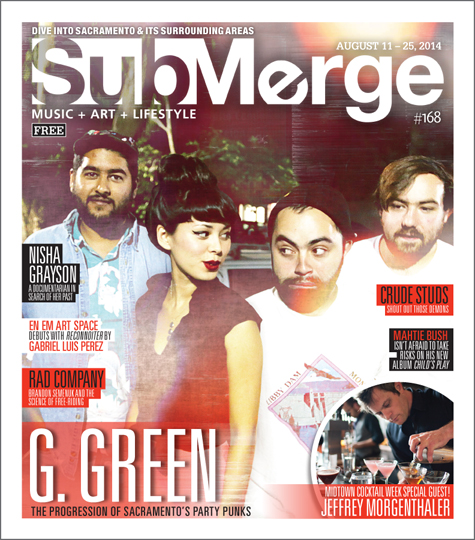
Celebrate the release of Area Codes Saturday, Aug. 30, 2014 at Witch Room (1815 19th St.) with G. Green, Rat Columns, Violent Change and more. The 18-and-over show starts at 8 p.m. and tickets are just $5. Check out
Facebook.com/ggreenband for more info.
Brown Shoe’s Baggaley Brothers Drink, Dance, Make Music and Actually Really Get Along
The origins of the band Brown Shoe stem from just outside the barbed wire fences of the Folsom prison. The members, all brothers, grew up so close to the prison that they fondly remember playing a game where they would see who could run closest to the barbed wire fence until the guards released warning shots. Ryan Baggaley, the self-proclaimed winner of this ballsy game, and older brother of the Brown Shoe clan, had plenty to say in a recent interview about brotherly love, X Street and being subtly bitter.
Brown Shoe formed almost 10 years ago as a mixture of friends and a couple of the Baggaley brothers. As time progressed, friends dropped out and were replaced with more Baggaleys. The final lineup consists of Ryan on vocals and guitar, Bryson on bass and drums, Aaron on keys and guitar and Landon on drums. The group is also known as “The nicest pack of bastards you will ever meet! Except not really, because we all know our dad—and have the same one!” according to their bio. A shared music nostalgia of Tom Petty and early ‘90s grunge (that has probably trickled down from brother to brother) influences the style of the band.
“We have a strong lean toward rock ‘n’ roll atmospherics. We aim for cleanliness and rhythm until climax,” says Ryan. “I love the suspense of suspending music until it just explodes.”
When asked about describing his music and the process of songwriting, Ryan says that music is often bogged down with the conformity of process. “We don’t walk into the studio with intentions. Someone will say ‘Hey, I wrote this song, let’s build on it and see what we can do,’ and then we sort of just feel it out. I like that we don’t bog the vibe down by making anyone explain what the song is about. We know a little bit, but then we just try to essentially get the same rhythm and sounds. There’s no need for discussion about it.”

One perfect description of Brown Shoes’ music is that it has mastered the art of being subtly bitter, consisting of beautiful, catchy and heartfelt tunes that tend to have a bit of snarkiness and backhanded intentions. The songwriting almost seems to teeter on the edge of classic rock with country song lyrics. The band has been compared to Sam Cooke and the Black Keys, but they prefer late-‘80s Bruce Springsteen, Sigur Ros and Arcade Fire: edgy and melodic.
Over the last 10 years, Brown Shoe has released five albums. This year, they are releasing a 4-part EP called Lonely Beast. Part 2 of the EP is out this month. They are also preparing to press the EP on vinyl and even cassette. Ryan elaborates, “Cassettes don’t necessarily mean a better sound. We are just excited to see how different our music will sound on tape as it ages. The ribbon of a cassette changes a little after each play, and the distortions that come with that sounds awesome.”
The foursome went from living a childhood in Folsom, to residing on X Street in Sacramento, to widening their California geographics and taking up residence in Los Angeles—a move they hoped would help them grow and keep them from feeling too comfortable.
“X Street and 26th in Sacramento was awesome,” Ryan says. “We lived right by the freeway and had a basement so we were able to play music essentially whenever we wanted because the sound was muffled by outside noise. We miss that amazing space. You also saw a lot of characters over there. For example, every night at an ungodly hour, this homeless man would whistle this very high pitched, abnormally birdlike whistle that would leave me and my brothers yelling obscenities out of our windows.”

As far as the music scene in Sacramento, “There are so many great things that city has,” says Ryan. “There are people in the community who realize the importance of strengthening a scene and giving it a platform. It’s all about community-based networks reaching out to traveling acts. We played the THIS concert series LowBrau put on last year, and we heard about LAUNCH now TBD, and the guys putting that on are just killing it. Putting large acts hand-in-hand with local acts is essential. It’s like potential is seeing itself grow into something extremely tangible and exciting.”
Recently, Brown Shoe released a video for their new song “Nightwalker,” about a friend who would tell them insane stories upon every interaction with him. One day, they asked the friend to sit with them and a rolling tape recorder and tell his life story in entirety. The results intrigued the Baggaleys, and they concocted “Nightwalker” in his honor, a beautiful tune with that subtle bitterness the band is so good at conveying. The video is dark and dusty with each brother dancing in shadows.
“My brother, Aaron, has excelled at the windmill as you will see in the video. It makes us all very jealous.” Ryan says. “Essentially we drank whiskey to the point where we could dance comfortably and feel it. I wish I could do that without whiskey, but my style is definitely to drink whiskey to get down.
“Sometimes we are close to gouging each other’s eyes out in the name of music. We will have huge blowups, but the cool thing is we almost immediately get over it. We are brothers and annoy each other, but we need each other,” Ryan continues. “Like with any band, you spend so much time with one group of people, you are bound to piss each other off.”
Ryan says the fact that they are brothers make them a bit more stronger and able to tolerate each other in an artistic endeavor like a band.
”We are a bunch of egotistical assholes and we are all the same. Therefore, we all get the pleasure of dealing with each other. We drink, we dance, we make music and we all actually really like each other.”
Welcome Brown Shoe home when they play Aug. 14, 2014 at Witch Room with Daniel and the Lion. Cover charge for the all-ages show is just $5, and it will begin at 6:30 p.m. Lonely Beast, Part Two is expected to be released on Aug. 19, 2014. Check out Facebook.com/brownshoemusic for more details.

FallRise: Capitalizing on Moments & Seizing Opportunities
Since 2010, Sacramento’s FallRise have been turning heads with their unique brand of heavy rock. Starting out like any other band, guitarists Dave Gorman and Matt Thomas had the duty of finding local talent to round out their roster. They recruited powerhouse vocalist Sammy Karlin, bassist Anthony Grant and drummer Isaiah Abdul-Rahman into the fold. The group quickly realized the importance of having a sound work ethic and used this strength to write and structure material that would blend styles of fierce metal and catchy popular rock ‘n’ roll.
With a debut EP and full-length album already under their belts, FallRise have spent the better part of a year focusing on writing, recording and producing their new record, Territories. Drawing obvious comparisons to Pantera and Alice in Chains, the mere fact that FallRise possess the ability to play ferociously heavy metal and stripped-down alternative rock on the same record is quite impressive. The group has also had the luxury of performing with legendary groups Deftones, Stone Temple Pilots and Bush at the 2012 Aftershock Festival.
Though gaining much popularity in the last couple years, the group has remained humble, citing that they owe everything to the undying support of their fans, to whom they’ll be giving a long-anticipated album release show on Saturday, May 3, 2014, at Ace of Spades in Sacramento. Submerge had the pleasure of meeting with Gorman and Karlin to discuss the inception of the band, lessons learned in the studio and their future goals.
How did you begin to gain notoriety on a local level and how has work ethic gotten you to your current status?
David Gorman: Matt and I started the project in 2008 and went through so many musicians, finding a specific attitude and style. We were specific in finding the most dedicated individuals as possible. We debuted in Sacramento in 2010 and have worked tirelessly ever since. In order to get where we want to be, we have to keep the ball rolling as a unit and as individuals within the band. If there’s any stagnant time, depression sets in. We always set deadlines and goals for what we’re doing to prevent hopes and dreams from remaining on the shelf.
Sammy Karlin: We strive to rehearse three times a week for about three to four hours at a time, honing in our sound and polishing our craft. We devote time to the band on a daily basis by coming up with new musical ideas, ways to tighten our sound and methods of marketing our band.
At what point did FallRise start to realize its potential?
DG: I knew we had something good going when we went to play at the Cedarwood Saloon in Grants Pass, Ore. It was our first time playing out of state and played in front of people we’d never met or connected with on a personal level. We left it all out on the line and got a great response, especially after showcasing some new songs. The crowd was fully engaged and turned upside-down when we busted out a cover of “Walk” by Pantera.
How do you effectively promote your shows and keep the attention of your fans?
DG: We pound the streets, make phone calls, put fliers out and use Facebook. But I believe a key to our success is to remain exclusive by playing shows less frequently and not exploiting our fans. We believe that does happen with oversaturation to the point where your fans and friends aren’t going to want to tell you no, so we want to have mutual respect with by not taking advantage of people. So we try to book every four to six months in Sacramento. When I was a kid, going to shows was a mystical experience. Nowadays, you can get on the Internet and instantly check a show from any band. We strive to make our shows a special experience that leaves fans with a lasting impression.
What can listeners expect from upcoming album Territories?
DG: A great mix of heavy riffs and catchy melodies, similar to our first full length, Back From the Dead; but we’re much happier with the outcome of the new record. We recorded the drums at Pus Cavern with engineer Matt Hyde, who has an impressive resume of working with bands like Deftones, Slayer and No Doubt. We then went to Hyde’s studio in L.A. to cut a few of the singles and returned home to work on the rest of the album in our own studio. Once the recording was finished, we sent it to top dog David Bendeth to mix the album, who is known for his outstanding work of getting the drums to sound tip-top. All of us, especially Isaiah, were very stoked on the recording because of how huge the drums sound.
There is a goal to stay away from being cookie-cutter. We’re trying to round out a commercialized sound with a sense of taste and creativity. We feel as though the vast array of sounds and styles, from metal to alternative rock, will go a long way for how this record is received.
SK: We’re happy with every track on the new record. Some of the songs are heavy and true to our signature sound, but we’ve also explored some new territory, hence the album name.
What are your plans for promoting Territories?
DG: Our album release show is set for May 3 at Ace of Spades in Sacramento. We’re relentless with promoting our events, but try to remain as tactful as possible.
SK: We gave a promo copy to Andy Hawk from 98 Rock to pump it on the radio and get some feedback. The hope is that they’re not going to throw your record in the garbage. We also have a solid fan base in California and Oregon, so our plan is to make our way up and down the West Coast in support of the new record.
How have your loyal fans boosted the presence and morale of your band?
DG: We’ve been fortunate enough to have the help of our fans with selling tickets, promoting our shows and blasting our music. It may sound cliché, but we wouldn’t be anywhere near where we are now if it wasn’t for our fans voting us into playing the Aftershock Music Festival in 2012. Ever since that performance, we’ve had much more recognition and attention from radio stations and promoters. This was a great time for us to capitalize on the moment by seizing the opportunity.
Check out FallRise for their release show at Ace of Spades on May 3, 2014. Tickets are $12 – $25; doors open at 6 pm. For more info, visit Facebook.com/fallriserock.
Sacramento hardcore/metal band Havenside is readying the release of their fourth album, Living Our Darkest Days. This one comes via the small New York-based Innerstrength Records. The twelve-track album will officially release on Tuesday, March 11, 2014, but you can pre-order all sorts of different bundles of merch right now including CD’s, vinyl, digital downloads, T-shirts, etc. at Innerstrengthrecords.bandcamp.com. Havenside’s official album release show will take place on Sunday, March 16, 2014 at Trigga Productions’ “Weirdo Fest” at Midtown BarFly (1119 21st Street, Sacramento). The lineup for Weirdo Fest is seriously stacked, featuring such bands as Conducting From the Grave, Lionheart, Hoods, Sworn Vengeance, With Wolves and a few others. The show is all ages and starts early at 5 p.m. There will also be a BBQ as well as a special burlesque performance by local model Tegan Shmegan. Tickets are $12 in advance, $15 at the door. For $18 you get entrance and food! Don’t miss what is sure to be one of the best local hardcore/metal shows in years in Sacramento, especially in Midtown! For more information on Havenside and to sample a couple tunes off the new album, head to Facebook.com/havensideofficial or Havensideband.com
Darling Chemicalia Releases Album Number Three, Spun in White
The word “evolution” implies not just adaptation to a changing environment, but also alludes to the increasing complexity of an organism. Local band Darling Chemicalia has been a fixture of the Sacramento live music scene for several years now, and they’ve reshaped, compounded in intricacy and proven their fitness to potential mates (you, the listener and showgoer) with the creation of their third record. Spun in White makes its official emergence in March.
Spun in White is the first Darling Chemicalia effort being put out by a record label— New York’s A Wicked Company. They recorded it themselves at their practice space, House of Hits, on Marconi. It showcases what the band is like live, and exhibits the new additions since Darling Chemicalia’s first two records, Valleys and Ghost Sketch, which were self-recorded by Ian Bone (vocals, guitar), Stephine Bone (vocals, keyboard) and Justin Gonzo (drums). Andrew Henderson (also in the totally rad band G. Green) lends a second guitar, and ex G. Green member Michael Feerick adds bass to the new record and evolution of Darling Chemicalia.
The 11 tracks that comprise Spun in White are each distinct from the last and catchier than a motherfucker upon repeated listens. The songs are spun together into an insidiously inviting web by common threads: youthful post-punk melodies; low-fi yet complex layered soundscapes; energizing pop influence; a dreamy underwater quality; Ian’s shaky, desperate vocals and Stephine’s raw, urgent, and longing vocals. Though they’ve preciously been compared to My Bloody Valentine and Sonic Youth, for me, Built to Spill qualities were immediately recognized when I first heard track one, “Final Girl.”
The album name comes from a Charles Bukowski poem, an excerpt of which reads:
“… And then the spider from his dank hole
nervous and exposed
the puff of body swelling
hanging there
not really quite knowing,
and then knowing—
something sending it down its string,
the wet web,
toward the weak shield of buzzing,
the pulsing;
a last desperate moving hair-leg
there against the glass
there alive in the sun,
spun in white;
and almost like love:
the closing over,
the first spider-sucking:
filling its sack
upon this thing that lived…”
As you can probably extrapolate from the tone of the poem above, the album is dark, and as Henderson described, “Claustrophobic—so much going on all the time in most of the songs… It’s what you’d feel like if you were in a crawl space and someone’s banging on the floor above you, but it’s good.” Henderson’s manner and voice reminded me of Mordecai from Regular Show.
It’s decidedly a loud, rocking record. Explains Ian Bone, “Growing up, I was super into Nirvana, and I never tried to do something like that. This doesn’t sound like Nirvana, but it’s as close as we can come to sounding like Nirvana. When you’re young, you get one record and obsess over it, immerse yourself in it. We don’t play a lot of shows where there are teenagers, and I want to know where the teenagers are. Because I wanted to make a record where some kid somewhere would listen to it and get obsessed. Actually listen to it all the way through.”
There’s so much going on musically in spite of managing to maintain minimalism, that it requires listening to it over and over again to really capture all of the things. Kind of like watching The Big Lebowski—no matter how many times I rewatch that movie, I catch some nuance in the dialogue that I’d never picked up on before, which makes it superior to a work that can be absorbed in one sitting.
“We’ve exhausted every melodic possibility for each song,” adds Ian, and while that’s mathematically improbable, the record is full of sound.
“Maybe we need to add a horn or something,” Henderson says jokingly.
“Yeah, that’s the next step,” concurs Ian sarcastically.
“We’ll make a ska record,” quips Gonzo.
Band dynamics will make or break even the most skilled group of musicians, and Darling Chemicalia is a tightknit alliance possessing pretty damn cute dynamics and dexterity to boot. In the beginning, it was just Gonzo, Ian and Stephine (the latter two had a baby three years ago). They added a guitarist momentarily but she didn’t work out.
One night in December 2012, when longtime homies Henderson and Feerick were going in on some booze with Gonzo and the Bones, Ian declared, “You should come join our band.” And so it was decided.
“It’s cool that we’re a band that is just friends anyway, and we’ve just become better friends,” Henderson elaborates. “We just like to play music together. We all look forward to band practice because we get to hang out with each other.” That camaraderie is palpable in the new record.
They rehearse once a week, randomly intersperse local shows, and on occasion venture out to San Francisco to perform. Their songwriting process varies. Ian brings ideas to the table half of the time, and as far as the other half goes, they’ll just be jamming at the beginning of practice and something worth exploring further arises. It took about a year to write the new record, and a year to record it—this was no haphazard process, but a painstaking and methodical one.
The album cover artwork for Spun in White is on par with the quality of the record itself. For the previous two albums, they utilized found photos, which are very cool images, but the new one was the first thing they actually did where it was a bit more premeditated.
“After we got married, Ian grabbed me and some residual wedding stuff…,” Stephanie Bone starts to explain.
“That sounds like a sexual thing, ‘it was our wedding night…’” teases Henderson.
“It wasn’t our wedding night, it was after we got married,” she clarifies.
The resulting picture is a beautiful, haunting image of a woman, spun in white, in itself a work of art.
Lofty future goals for the band? Define lofty…
“I’m still stoked every month that goes by that we’re all still doing this,” Ian says. “I don’t have any delusions of grandeur that we’ll be on the cover of the Rolling Stone or anything like that… if we can keep making something that’s good, as long as all of us are interested in doing it, then that’s good enough.”
“We’re finally going to go play in the Northwest, and that’s a huge step for this band,” adds Gonzo.
I disagree. Maybe they won’t get richer, or get their picture on the cover of the Rolling Stone, but I wouldn’t be surprised if this band is asked to play festivals like SXSW within the next couple of years, or is at least pleasantly surprised by a wealth of affirming, great reviews by notable music publications—not unlike this review.
Catch Darling Chemicalia at Witch Room’s first show on Tuesday, March 25 with Wax Idols, Wreck And Reference, So Stressed and Hollow Sunshine. Starts at 8 p.m., $8 cover, 18-and-over. Witch Room is located at 1815 19th Street (Bows and Arrows’ old space). For more information, visit Witchroomsac.com.
The Kennedy Veil doesn’t sacrifice vitality for technicality
The Kennedy Veil is Sacramento’s personal pathway to all the aggression, intricacies and power death metal offers its listeners. Since 2009, the guys supported longtime metal and death grind acts like Cattle Decapitation, Macabre and Origin. Now, the band prepares for its album release show for Trinity of Falsehood with support from Inanimate Existence, Cyanic and more on Tuesday, Jan. 21, 2014, at On the Y. Over a pitcher of beer at the Old Tavern Bar and Grill, drummer Gabe Seeber and guitarist KC Childers sat down with Submerge to discuss the symbolism behind the album, the newest addition to the band (19-year-old vocalist Taylor Wientjes) and the overall charms and attraction to the death metal genre.
What song is most satisfying to perform off the new album, Trinity of Falsehood?
KC Childers: The song “Ashes” is my favorite. It showcases what the whole album’s about. The whole album literally goes through stages. We’re not a death metal band that sticks to a specific style. [The album] has melodic, heavy and brutal parts. It’s all movements in a sense and comes out like total chaos, but there’s structure.
Are perfection, levels of difficulty or challenging techniques a priority during the writing process?
KC: We want our album to sound perfect, but at the same time, people know that we can play every single fucking note that we write live. There are very few bands that play with some type of balls. A lot of it is over-polished studio magic. To me, that’s the biggest problem in our genre, is that music’s become this precise thing. I want to see a band that has a chip on their shoulder live.
Gabe Seeber: People don’t like Pantera because they play perfect live. They like them because they’re aggressive live and they get the crowd moving.
Is there an overall theme to the album?
GS: There are definitely some religious aspects to it, but it’s more the downfall of society and the degradation of mankind. A lot of people follow faiths blindly: is it a sense of morality, or is it you being a good person because the Bible tells you so?
Tell me about the symbolism behind the album’s artwork.
KC: On the album cover, there are three beings, which relates to the Bible [and] the trinity of falsehood, like the Father, the Son and the Holy Ghost. The way I describe it best is, what would humanity do if three beings came down and were presenting themselves as gods? Would you know the difference? Would you answer to the same beliefs that you were raised with? Would you know the difference between being a good human being or would you follow set rules?
What lured you both toward death metal?
GS: A lot of metal in general was interesting to me because it was reminiscent of classical [music], but done in a different way with heavier drumming and distortion. It caught my attention easily. If you listen to older, classical piano and compare it to something like Necrophagist, the guitar solos will be really reminiscent of what you hear in classical piano.
KC: The music had a lot of power. It got people moving. It was always real and it has this blue-collar aspect to it that I love.
What sets The Kennedy Veil apart from other bands?
KC: When I play guitar, I’m not worried if you give a shit about how many notes I’m playing or how fancy you think what we’re doing is. I want the overall feeling of what we’re doing to be epic. You should feel accomplished as a musician. We don’t mind pounding our chest, I guess. I think that’s what our genre needs. If you get the chance to come see us live, our music has more of that raw vibe to it.
Do you feel death metal has an audience in Sacramento?
KC: To be honest, we have some of the strongest groups of bands death metal-wise here in Sacramento. Even younger bands like the guys in Extirpate are so talented. I see a lot of talent in our scene, so there’s growth in that sense. I think Sacramento’s biggest problem in general is there is a scene here, but the only way you destroy a scene is overpopulating it with so many stupid shows where the same band you saw play Saturday, plays next week.
GS: I think another part of the problem is there are so many young kids and the only places they can go to see a show is the Boardwalk or Ace of Spades. With this genre in Sacramento, there are so many kids that want to go to these shows, but they can’t. Most of the metal scene here is younger kids.
Taylor Wientjes, at 19 years old, is the new vocalist of The Kennedy Veil. Was his age an intimidating factor in the search for a frontman?
KC: For me, not at all. My big thing was always confidence. Outside of that, it was important to get somebody into the band that would be like a family member. We’re like a family. We argue like a family, but we’re very business-savvy as far as our time and our money goes because we plan on this being our careers.
What is The Kennedy Veil looking forward in 2014?
KC: I’m looking forward to a great year. We didn’t get into this to be millionaires—thousandaires would be nice. [Laughs] When I listen to the new album, I think we could be one of those bands that breaks into new demographics. [Our music] isn’t verse, chorus, verse, chorus. It’s not a radio song. There’s enough emotion there to catch people.
Visit Facebook.com/thekennedyveil for more info.
Sacramento experimental band Cove readies for first EP and tour
It’s two weeks before Scott Ferreter’s band Cove drops its first EP (mostly self-recorded in Ferreter’s mom’s basement), and before the trio goes on its first tour in the freshly purchased “Cove Mobile.” He doesn’t explicitly state it, but Ferreter sounds like he’s floating on nirvana right now.
The 24-year-old Sacramento native patiently waited for these pieces to come together since he left his last band, Comfort Twin, in Santa Cruz more than a year ago.
“It was a zoo to begin with, an eight-piece band and half lived in the Bay Area and the other half in Santa Cruz,” he recalls. “It was a really fun band. Eight pieces is a real pain in the ass for getting together, but once you got it together, in every sense of the word, it was great.”
Ferreter moved back to Sacramento when his dad was diagnosed with cancer, and shortly thereafter Comfort Twin dissolved. The move became an opportunity to create the band he always wanted.
“Once I moved back I was really excited to start a more straightforward band,” he says. Through advertising and hanging fliers at Javalounge downtown, Ferreter met drummer Steven Cranston and 27-year-old bassist Charlie Dale.
The three fine-tuned their sound and lyrics, and had the EP and tour upcoming when Cranston left the band after getting a job. Ferreter became frantic to find a drummer last-minute.
“Our musical existence was weighing heavily on finding a drummer. I was worried we would have to settle so it was humorous when Omar pulled up and he was exactly what we wanted,” Ferreter says. “Charlie and I pontificated on finding a drummer, saying we should get someone who is good at even asking for money at the end of the night. The two of us, we’re not tough guys, so when Omar said the other day, ‘two things I really like is dealing with sound guys and dealing with club owners,’ it was meant to be.”
Omar Barajas, 23, also from Sacramento, joined Cove after stints in other local bands.
“The other bands I played in were completely different,” he says, on break from his day job. “The first was instrumental, then I toured with Sister Crayon and that’s electronically driven with heavy beats. But Cove is really mellow.”
It was a welcome change. Barajas, whose major influences are jazz and bands like Silversun Pickups, wanted a slower pace.
“I was used to just banging my drums, but now I’m focusing more on my technical skills,” he says.
He joined right after Cove recorded its EP. The new trio had their first show in mid-October and Barajas says he’s been able to see the backbone of the songs and insert his own style.
“Scott is a good songwriter, so it’s easy to get lost in the music.”
Ferreter says most of the seven songs on this EP came about from jamming together.
“When I got to Sacramento I had all these songs that I wanted to put on an album. As we started playing together, it was immediate, we saw this energy together that we couldn’t create on our own,” he says. “Cove is my first experience of actual co-writing. These sounds would not have happened had these exact people not been together at that time. Everyone has differing interests and musical paths but there is enough overlap in the stuff that matters: how to approach music, the process of playing together.”
And then there is a good amount of absolute happenstance, Ferreter says.
“I’m a Craigslist junkie, mostly in the name of getting a band together, so if a show needs to happen, I’ve got the stuff for that. I found this $30 electric piano and like a week later, we met Charlie and piano was his first instrument,” Ferreter says. “The last band he was in, he was playing drums but he was really excited about playing piano, and it became instrumental to us as a band.”
On their self-released album, Dale plays electric piano, synthesizer and bass. A few songs also have horns with help from one of Ferreter’s former bandmates, and extra vocals with help from David Lipp, who recorded half the record and, according to Ferreter, “took the project from an absolute zygote to a complete creature ready for the world.
“David (Spare Room Studios, San Francisco) did all of the engineering and I just cannot say enough about it,” he says. “He did it out of the love for the music. He took a handful of sand and turned it into a nice tropical beach. I’ve come to a loss of words, I can’t say enough.”
Some sounds from the album will obviously not be part of the tour, such as Lipp’s vocals, the horns and a full-sized harp that Dale received as a birthday rental.
“Of course in the middle of recording this album, we have a harp so it’s a no-brainer,” Ferreter laughs.
The album doesn’t have a theme per se, but the band thinks of it as more a process of selection.
“These are the songs over the last year we’ve felt a lot of energy from. We were thinking of timing, of this era of our lives. We have some songs that are some of our favorites, but we didn’t end up including them because certain songs feel like they ripen and will start rotting soon thereafter. We play what’s feeling ripe right now, what’s relevant right now. It was also about what tools we have. We have some grandiose ideas for other songs but don’t have what we would need to record them yet.”
For now, the band says, the EP and the tour is the direction they’re moving musically. It’s not a hint of what they’re doing—seven songs could be considered an album—it’s a full piece of pie.
“Basically,” Barajas adds, “If you appreciate good songwriting and cohesiveness, you’re gonna dig it. If you like folky writing, you’re gonna dig it.”

The tour and EP release party start at Luigi’s Fun Garden Nov. 7, 2013 with tickets on a sliding scale from $5 to $10. The orbit of the tour will be around Seattle, Olympia and Portland and will last two weeks. Check out Covetheband.com for more information and to sample two recordings.
Eli and the Sound Cult works within established tropes to push the possibilities of pop music
If you think that the modern universe of pop music is composed of a homogeneous parade of sexed-up, music-industry drones, you’re probably not alone. Like an army of tongue-wagging, good-girls-gone-bad, some artists seem intent on pushing the boundaries of popular music to the brink of triviality.
For Elijah Jenkins and Jason Bove, the two members of Eli and the Sound Cult, their allegiance to the ethos of pop just might save the genre from a scourge of banality, just as long as it doesn’t interfere with their other shared passions: skateboarding, rock climbing and bread-and-butter pickles.
Drawing on a variety of sonic influences from Prince to Ween, the band’s debut album Best of Pop is an opus of sound that marries rock, soul and, of course, pop music.
“It’s kind of an amalgamation of all that stuff that we grew up listening to.” Bove says. “That spanned punk rock to metal to radio music to everything that inspired us as kids, you know, skateboarding culture and music culture.”
The two Sacramento transplants—Bove hails from Illinois and Jenkins is from Bakersfield, Calif.—realized after a chance meeting at Sacramento Pipeworks Climbing and Fitness gym that their combined talents and shared interests made for the perfect pop experiment. However, the duo isn’t looking to forge new musical trails, but rather to put out an album that provides their audience a visceral and engaging musical experience that celebrates the pop ilk.
“There are definitive things that it is not,” Jenkins says. “It is not post-anything, it’s not post-punk, it’s not trying to do anything new as much as it’s trying to exist within the walls of stuff that already exists. We’re not trying to push boundaries on this album, what we try to do is make waves within the walls that already exist.”
As a genre, pop music is exceedingly broad-based, often assimilating elements from other genres like hip-hop, dance, rock and indie, featuring accessible songs written in the verse-chorus-verse construct awash with melodic tunes and catchy hooks, and Best of Pop delivers exactly that.
“I think we push boundaries insomuch as we feel like it’s OK on one album to write a funk song, and an indie song, and a blues song, and a rock song,” Jenkins continues. “But we’re not trying to push genre lines, we’re just trying to say you can do whatever you want, you don’t have to be genre-specific in your music.”
“I go back to Prince as a good example,” Bove adds. “He’s pop music, but he’s not limited by pop music. That guy can do whatever he wants, so we kind of want to do whatever we want.”
Like a lot of pop music, much of the album’s inspiration draws from facet of the human condition: Love.
“We’re all chasing around boys or girls. I mean, I think that’s a large part of the pop element, too,” Jenkins says. “There’re no songs on this album that aren’t love songs, and they’re either [about] running toward it, running away from it or struggling with it. The fact that we wrote an album that’s eight love songs about five different women should be indicative of something.”
“Well, a lot of it, too, is love lost, right?” Bove adds. “We’ve all kind of been through relationships that haven’t worked but that have brought you to a different space in life. And then it’s trying to figure out why you’re in that space, and it’s because of your choices and your path. I wouldn’t be in Sacramento if it wasn’t for relationships.”
Continuing on this lyrical path, having recently concluded a successful Kickstarter campaign that helped the duo procure a van to take their pop party out on the road and preparing for an upcoming tour that kicks off with an album release party on Oct. 18 at Sacramento Space, Jenkins and Bove are already looking toward the future, without being bound by the trappings of their work.
“We’ve already started talking about the next project, which will involve us throwing everything out in a very Ween style…throwing the entire aesthetic out and going, ‘OK we’re going to create something totally new,’” Jenkins explains. “Then we’ll throw that out, then do whatever we want to do next, but I’ve always wanted to be in a band where we don’t feel pressure to play old stuff.”
Part of the band’s current aesthetic involves an engrossing live show that incorporates multi-media elements, including dynamic light installations and projected images drawing from popular culture figures syncopating in time with the beats emanating from their speakers.
“This movement is closer to a high-energy art installation,” Jenkins says. “That’s really the only sense where I feel like we’re pushing boundaries, this is an art piece, this is not a jazz ensemble.”
“Pre-Bitches Brew Miles, rather than post-Bitches Brew Miles.” Bove chuckles.
The duo’s genuine esteem for one another is evident, from their quip-y offstage banter to their keen ability to synthesize a singular message onstage and in the studio. Their meticulously crafted shows, like their music, is a catalyst for sparking a combustible reaction that explodes through the audience like a volcanic eruption.
“We want people to have a weird, amazing experience and walk away feeling a little changed. I want them to come away with the idea that they’ve been to a show that was well-choreographed, that was made to make them feel something emotional,” Jenkins says. “I want people to walk away with an emotional experience, where they feel like something has been added or taken away from them.”
“I’ve definitely seen people with their mouths hanging open like they were watching somebody be killed or something they didn’t expect to see,” Bove adds.
From skateboarding around town to scaling craggy peaks, on and off tour, their personalities complement rather than collide—as the frontman and singer, Jenkins’ vociferous nature is engaging and jovial while Bove’s quiet, introspective reserve reverberates perfectly in time as softly caresses the strings on his bass.
“I think we like the constraints of having to work within what two people can do. Essentially we have eight limbs that we can work with and that’s it,” Jenkins explains. “But the nice thing is that we only have to deal with two people’s egos, two people’s schedules, two people’s desires, and we get along. Like, I’ve never been in a band where everybody gets along. We butt heads plenty of times on vision and all that, but neither one of us are purists. We never go, ‘It has to be this way.’”
The twosome’s frenetic energy, undeniable bond and surging creativity is the perfect recipe for musical harmony, but it’s their boyish charm and quirky sensibility that may find their empire expanding into Vlasic’s territory.
“Pickles are fantastic. I might start pickling everything,” Jenkins beams. “Apparently you can pickle grapes; red wine vinegar, Sriracha and grapes. I had them at Total Wine; they were fantastic. The sweetness of the grape against the vinegar made them savory and the Sriracha made them spicy. Imagine a savory, spicy fruit.”
Eli and the Sound Cult’s Music and Pickle Emporium, now that has a nice ring to it.
Prepare to get your pants charmed off when Eli and the Sound Cult celebrate their record release at Sacramento Space on Oct. 18, 2013 at 8 p.m. Sun Valley Gun Club will also perform, all for a suggested donation of $5. This is the first show of the band’s winter West Coast tour, so give them a proper send off. Learn more about the band at Facebook.com/eliandthe.



